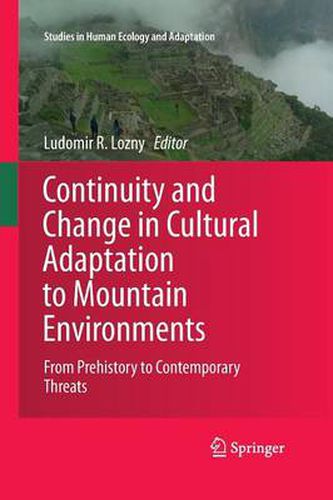Readings Newsletter
Become a Readings Member to make your shopping experience even easier.
Sign in or sign up for free!
You’re not far away from qualifying for FREE standard shipping within Australia
You’ve qualified for FREE standard shipping within Australia
The cart is loading…






This title is printed to order. This book may have been self-published. If so, we cannot guarantee the quality of the content. In the main most books will have gone through the editing process however some may not. We therefore suggest that you be aware of this before ordering this book. If in doubt check either the author or publisher’s details as we are unable to accept any returns unless they are faulty. Please contact us if you have any questions.
Up until now, mountain ecosystems have not been closely studies by social scientists as they do not offer a readily defined set of problems for human exploitation as, do for instance, tropical forests or arctic habitats. But the archaeological evidence had shown that humans have been living in this type of habitat for thousands of year.
From this evidence we can also see that mountainous regions are often frontier zones of competing polities and form refuge areas for dissident communities as they often are inherently difficult to control by centralized authorities. As a consequence they fuel or contribute disproportionately to political violence. But we are now witnessing changes and increasing vulnerability of mountain ecosystems caused by human activities.
Human adaptability to mountain ecosystems This volume presents an international and interdisciplinary account of the exploitation of–and human adaptation to–mountainous regions over time. The contributions discuss human cultural responses to key physical and cultural stressors associated with mountain ecosystems, such as aridity, quality of soils, steep slopes, low productivity, as well as transient phenomena such as changing weather patterns, deforestation and erosion, and the possible effects of climate change.
This volume will be of interest to anthropologists, ecologists and geologists as mountainous landscapes change fast and cultures disappear and they need to be recorded, and mountain regions are of interest for studies on environmental change and cultural responses of mountain populations provide clues for us all. Critical to understanding mountain adaptations is our comprehension of human decision-making and how people view short- and long-term outcomes.
$9.00 standard shipping within Australia
FREE standard shipping within Australia for orders over $100.00
Express & International shipping calculated at checkout
This title is printed to order. This book may have been self-published. If so, we cannot guarantee the quality of the content. In the main most books will have gone through the editing process however some may not. We therefore suggest that you be aware of this before ordering this book. If in doubt check either the author or publisher’s details as we are unable to accept any returns unless they are faulty. Please contact us if you have any questions.
Up until now, mountain ecosystems have not been closely studies by social scientists as they do not offer a readily defined set of problems for human exploitation as, do for instance, tropical forests or arctic habitats. But the archaeological evidence had shown that humans have been living in this type of habitat for thousands of year.
From this evidence we can also see that mountainous regions are often frontier zones of competing polities and form refuge areas for dissident communities as they often are inherently difficult to control by centralized authorities. As a consequence they fuel or contribute disproportionately to political violence. But we are now witnessing changes and increasing vulnerability of mountain ecosystems caused by human activities.
Human adaptability to mountain ecosystems This volume presents an international and interdisciplinary account of the exploitation of–and human adaptation to–mountainous regions over time. The contributions discuss human cultural responses to key physical and cultural stressors associated with mountain ecosystems, such as aridity, quality of soils, steep slopes, low productivity, as well as transient phenomena such as changing weather patterns, deforestation and erosion, and the possible effects of climate change.
This volume will be of interest to anthropologists, ecologists and geologists as mountainous landscapes change fast and cultures disappear and they need to be recorded, and mountain regions are of interest for studies on environmental change and cultural responses of mountain populations provide clues for us all. Critical to understanding mountain adaptations is our comprehension of human decision-making and how people view short- and long-term outcomes.